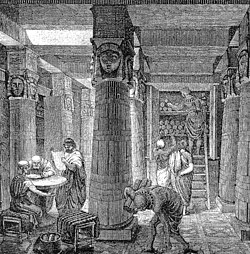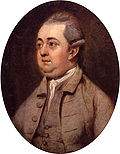Portal:History
The History Portal
History is the systematic study of the past, focusing primarily on the human past. As an academic discipline, it analyses and interprets evidence to construct narratives about what happened and explain why it happened. Some theorists categorize history as a social science, while others see it as part of the humanities or consider it a hybrid discipline. Similar debates surround the purpose of history—for example, whether its main aim is theoretical, to uncover the truth, or practical, to learn lessons from the past. In a more general sense, the term history refers not to an academic field but to the past itself, times in the past, or to individual texts about the past.
Historical research relies on primary and secondary sources to reconstruct past events and validate interpretations. Source criticism is used to evaluate these sources, assessing their authenticity, content, and reliability. Historians strive to integrate the perspectives of several sources to develop a coherent narrative. Different schools of thought, such as positivism, the Annales school, Marxism, and postmodernism, have distinct methodological approaches.
History is a broad discipline encompassing many branches. Some focus on specific time periods, such as ancient history, while others concentrate on particular geographic regions, such as the history of Africa. Thematic categorizations include political history, military history, social history, and economic history. Branches associated with specific research methods and sources include quantitative history, comparative history, and oral history.
History emerged as a field of inquiry in antiquity to replace myth-infused narratives, with influential early traditions originating in Greece, China, and later in the Islamic world. Historical writing evolved throughout the ages and became increasingly professional, particularly during the 19th century, when a rigorous methodology and various academic institutions were established. History is related to many fields, including historiography, philosophy, education, and politics. (Full article...)
Featured picture
Did you know (auto generated)

- ... that the historic water stream Seil Amman was roofed to make way for a road in the 1960s?
- ... that the Netflix-released film A House in Jerusalem is inspired by the history of the director's Palestinian family, who were expelled in 1948 from what had become Israel during the Nakba?
- ... that the 1925 Tri-State tornado was the deadliest in United States history?
- ... that Veto, inspired by the history of the Polish–Lithuanian Commonwealth, is considered to be the first Polish collectible card game?
- ... that the Otoskwin–Attawapiskat River Provincial Park, protecting the Otoskwin and Attawapiskat Rivers in Ontario, Canada, has archaeological and historical sites dating from 3000 BC to the 1800s?
- ... that Alfredo Frohlich formed an award-winning collection of Panamanian postal history that included items from as early as 1777?
Dom Pedro II (Pedro de Alcântara João Carlos Leopoldo Salvador Bibiano Francisco Xavier de Paula Leocádio Miguel Gabriel Rafael Gonzaga; 2 December 1825 – 5 December 1891), nicknamed the Magnanimous (Portuguese: O Magnânimo), was the second and last monarch of the Empire of Brazil, reigning for over 58 years.
Pedro II was born in Rio de Janeiro, the seventh child of Emperor Dom Pedro I of Brazil and Empress Dona Maria Leopoldina and thus a member of the Brazilian branch of the House of Braganza (Portuguese: Bragança). His father's abrupt abdication and departure to Europe in 1831 left the five-year-old as emperor and led to a lonely childhood and adolescence, obliged to spend his time studying in preparation for rule. His experiences with court intrigues and political disputes during this period greatly affected his later character; he grew into a man with a strong sense of duty and devotion toward his country and his people, yet increasingly resentful of his role as monarch. (Full article...)
On this day
- 1478 – In a conspiracy to replace the Medici family as rulers of the Republic of Florence, the Pazzi family attacked Lorenzo de' Medici (pictured) and killed his brother Giuliano at Florence Cathedral.
- 1915 – First World War: Britain, France and Russia signed a secret treaty promising territory to Italy if it joined the war on their side.
- 1933 – The Gestapo, the official secret police force of Nazi Germany, was established.
- 1989 – A tornado struck the Manikganj District of Bangladesh and killed an estimated 1,300 people, making it the deadliest tornado in history.
- 1994 – Just before landing at Nagoya Airport, Japan, the copilot of China Airlines Flight 140 inadvertently triggered the takeoff/go-around switch, causing the aircraft to crash and killing 264 of the 271 people on board.
- Marcus Aurelius (b. 121)
- Alice Ayres (d. 1885)
- S. J. V. Chelvanayakam (d. 1977)
Selected quote
Time's glory is to command contending kings,
To unmask falsehood, and bring truth to light.— William Shakespeare, playwright
Related portals
More Did you know...
- ... that, when Ghenadie Petrescu (pictured) was ousted from his post of Metropolitan-Primate, Romania experienced protests and riots?
- ... that the British destroyer HMS Highlander escorted Convoy SC 122 through the largest convoy battle of World War II in March 1943 and was unsuccessfully attacked by U-441 and U-608?
- ... that in 1911, John Gaunt's second biplane nearly crashed because a bystander bent the aircraft's elevator before a flight?
- ... that Themistokli Gërmenji, an Albanian nationalist, received the French Croix de Guerre in November 1917, but was executed shortly thereafter by a French military court?
- ... that fish-knives inscribed with Elokeshi's name were sold after her husband decapitated her with a fish-knife following her adulterous affair with a Hindu head-priest?
- ... that the ancient Roman dancer Galeria Copiola reached the age of 104?
- ... that to escape burning at the 1393 Bal des Ardents Charles VI of France huddled under the gown of the Duchesse de Berry, while a lord leaped into a wine vat?
- ... that a junior officer on the USS Ancon refused King George VI entry to the ship's intelligence centre because no one told him the King "was a Bigot"?
Topics
Categories

History • By period • By region • By topic • By ethnic group • Historiography • Archaeology • Books • Maps • Images • Magazines • Organizations • Fictional • Museums • Pseudohistory • Stubs • Timelines • Chronology • People • Wikipedia historians
WikiProjects
![]() WikiProject History •
Ancient Near East • Australian History • Classical Greece and Rome • Dacia • Former countries • History of Canada • Chinese history • European history • Heraldry and vexillology • Indian history • Jewish history • Medieval Scotland • Mesoamerica • Military history • Middle Ages • History of Science
WikiProject History •
Ancient Near East • Australian History • Classical Greece and Rome • Dacia • Former countries • History of Canada • Chinese history • European history • Heraldry and vexillology • Indian history • Jewish history • Medieval Scotland • Mesoamerica • Military history • Middle Ages • History of Science
WikiProject Time • Days of the Year • Years
WikiProject Biography • Composers • Political figures • Saints • United States Presidents
Things you can do
 |
Here are some tasks awaiting attention:
|
Associated Wikimedia
The following Wikimedia Foundation sister projects provide more on this subject:
-
Commons
Free media repository -
Wikibooks
Free textbooks and manuals -
Wikidata
Free knowledge base -
Wikinews
Free-content news -
Wikiquote
Collection of quotations -
Wikisource
Free-content library -
Wikiversity
Free learning tools -
Wiktionary
Dictionary and thesaurus























































